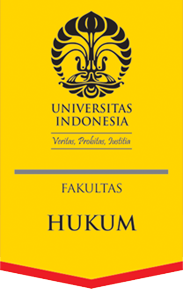DOI
10.21143/jhp.vol50.no4.2856
Abstract
Wages is one of the elements in the employment relationship between an employer and a worker/employee based on the employment agreement. In accordance with the fundamental principle that is basically applicable to every workers/employees, wages will not be paid by employers if the workers/employees do not perform work (no work no pay). However in its development, there is an issue in the application of such principle since the ruling of the Decision of the Constitutional Court of Republic of Indonesia, which obliges employers to pay the wages to workers/employees who do not work because they are in the process of termination of employment until a decision has its permanent legal force (inkracht van gewijsde). The issue becomes even more complex when the obligation to pay wages is reaffirmed by the Supreme Court of Republic of Indonesia for 6 (six) months, thus the excess time in the industrial relations dispute process is not an obligation for employers.
References
Soetiksno. Hukum Perburuhan. Jakarta: 1979.
Subekti, R, dan R. Tjitrosudibio. Kitab Undang-Undang Hukum Perdata [Burgerlijk Wetboek]. Cet. 34. Jakarta: Pradnya Paramita, 2004.
Palguna, I Dewa Gede. Mahkamah Konstitusi, Judicial Review, dan Welfare State, Kumpulan Pemikiran I Dewa Gede Palguna. Cet. 1. Jakarta: Sekretariat Jenderal dan Kepaniteraan Mahkamah Konstitusi, 2008.
Uwiyono, Aloysius, et. al. Asas-Asas Hukum Perburuhan. Ed. 2, Cet. 3. Depok: PT RajaGrafindo Persada, 2018.
Kasim, Umar. Upah Selama Masa Skorsing. https://www.hukumonline.com/klinik/detail/ulasan/lt4d56a0a460363/upah-selama-masa-skorsing-/. Diakses tanggal 14 September 2019.
McLean, H. Contract of Employment. Negative Covenants and No Work, No Pay. The Cambridge Law Journal. Vol. 49. 1990. 28-31: 29.
Yetniwati. Pengaturan Upah Berdasarkan atas Prinsip Berkeadilan. Mimbar Hukum. Vol. 29, No. 1. 2017, 82-95: 88.
Peraturan Indonesia, Undang-Undang Dasar Tahun 1945.
Indonesia, Undang-undang Nomor 12 Tahun 1964 tentang Pemutusan Hubungan Kerja di Perusahaan Swasta, Lembaran Negara Republik Indonesia (LNRI) Tahun 1964 Nomor 93, dan Tambahan Lembaran Negara (TLN) Nomor 2686.
Indonesia, Undang-undang Nomor 13 Tahun 2003 tentang Ketenagakerjaan, Lembaran Negara Republik Indonesia (LNRI) Tahun 2003 Nomor 39, dan Tambahan Lembaran Negara (TLN) Nomor 4279.
Indonesia, Undang-undang Nomor 2 Tahun 2004 tentang Penyelesaian Perselisihan Hubungan Industrial, Lembaran Negara Republik Indonesia (LNRI) Tahun 2004 Nomor 6, dan Tambahan Lembaran Negara (TLN) Nomor 4356.
Pemerintah RI, Peraturan Pemerintah Nomor 78 Tahun 2015 tentang Pengupahan, Lembaran Negara Republik Indonesia (LNRI) Tahun 2015 Nomor 237, dan Tambahan Lembaran Negara (TLN) Nomor 5747.
Menteri Tenaga Kerja dan Transmigrasi RI, Keputusan Menteri Nomor Kep.150/Men/2000 tentang Penyelesaian Pemutusan Hubungan Kerja dan Penetapan Uang Pesangon, Uang Penghargaan Masa Kerja dan Ganti Kerugian di Perusahaan.
Menteri Tenaga Kerja dan Transmigrasi RI, Keputusan Menteri Nomor Kep.78/Men/2001 tentang Perubahan atas Beberapa Pasal Keputusan Menteri Tenaga Kerja RI Nomor Kep-150/Men/2000 tentang Penyelesaian Pemutusan Hubungan Kerja dan Penetapan Uang Pesangon, Uang Penghargaan Masa Kerja, dan Ganti Kerugian di Perusahaan.
Mahkamah Konstitusi RI, Putusan Nomor 37/PUU-IX/2011 tanggal 19 September 2011.
Mahkamah Agung RI, Surat Edaran Nomor 3 Tahun 2015 tentang Pemberlakuan Rumusan Hasil Rapat Pleno Kamar Mahkamah Agung Tahun 2015 sebagai Pedoman Pelaksanaan Tugas Bagi Pengadilan pada tanggal 29 Desember 2015
Recommended Citation
Gunadi, Fitriana
(2020)
"UPAH PROSES DALAM PEMUTUSAN HUBUNGAN KERJA,"
Jurnal Hukum & Pembangunan: Vol. 50:
No.
4, Article 5.
DOI: 10.21143/jhp.vol50.no4.2856
Available at:
https://scholarhub.ui.ac.id/jhp/vol50/iss4/5
Included in
Administrative Law Commons, Comparative and Foreign Law Commons, Constitutional Law Commons, Criminal Law Commons, Natural Resources Law Commons

